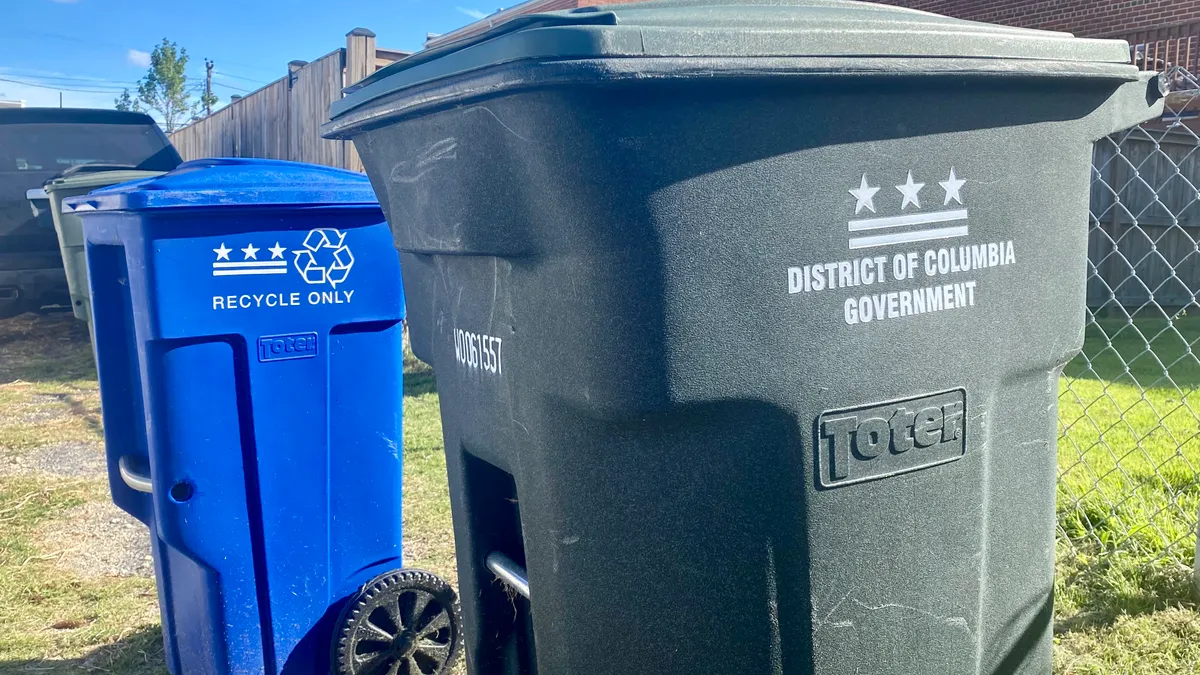Dive Brief:
- The District of Columbia plans to launch an opt-in curbside organics collection pilot for more than 9,000 households by the end of September. Residents who receive trash and recycling services from D.C.’s Department of Public Works were eligible to sign up for the year-long program.
- Compost Crew, a company that offers curbside collection services for homes, businesses and local governments, will be the main collections contractor. Compost Cab, another area compost company, will assist with collections for a portion of the city.
- D.C. already offers about 10 drop-off sites where residents can take their compost, but the curbside pilot program is meant to make composting more accessible throughout the city and improve progress on D.C.’s goal of diverting 80% of the city’s waste away from landfills and incineration by 2032.
Dive Insight:
D.C. set its diversion goal back in 2013, and it’s now in the process of developing a comprehensive zero waste plan. Though the final plan hasn’t been announced yet, numerous composting strategies — including improving residential composting access — were mentioned as part of the draft framework.
D.C.’s FY 2023 budget includes about $4.3 million in one-time funding to launch the curbside pilot. It will be the newest city in the region to launch a curbside composting program, joining nearby cities such as Falls Church and Alexandria in Virginia and Chevy Chase in Maryland.
Major cities around the country have found success from launching similar programs. Last year, Boston launched a curbside compost pilot and continues to offer the service.
During a webinar that DPW’s Office of Waste Diversion hosted on Monday for D.C. program participants, Jessica Smith, DPW’s chief administrative officer, said the program “is a really important strategy and technique for reducing the District’s waste” and is “a great step in the right direction” toward meeting the 80% diversion rate goal.
Pilot participants will receive a five-gallon compost container made of heavy plastic with a secure screw-top lid, as well as a smaller kitchen caddy to keep scraps. Program organizers tested several collection container designs and sought input from D.C.’s health department to determine which type would be best for odor and rodent mitigation, added Rachel Manning, DPW’s zero waste program analyst, during the webinar.
The compost program might have the added benefit of reducing rats because less food waste is going into trash bins, Smith told participants. Most residential trash bins in D.C. have lids that swing open from the top, where rodents can sometimes enter.
Ben Parry, Compost Crew’s CEO, said the company is excited to work with the city. Compost Crew has provided composting services in the region for about 12 years, including drop-off and curbside services for other Maryland and Virginia municipalities. It also operates composting systems at municipal sites such as in Virginia’s Fairfax County. “We want everyone to be able to participate in the composting movement,” he told participants.
Food waste collected through the program will be processed into compost, likely at the Prince George’s County Composting Facility in Maryland, according to DPW. At the end of the one-year program, DPW says it plans to deliver at least five pounds of finished compost to participating households.
The department will collect data and feedback from participants throughout the pilot program, with the goal of continuing the service into the future, Smith said. “Our hope is that we can expand this to anyone who wants to participate in the district,” she said.














